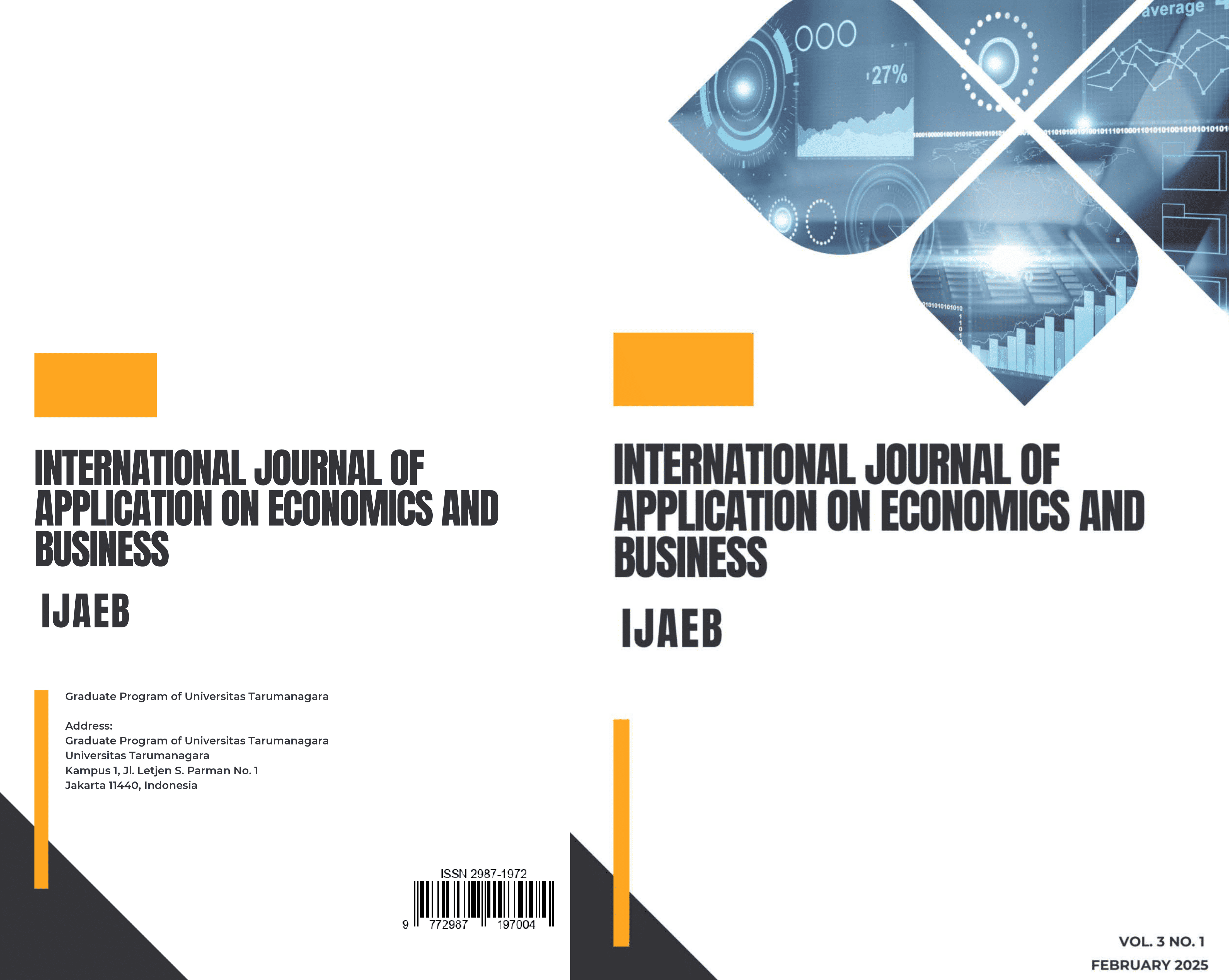FRAUD PENTAGON THEORY FOR DETECTING FINANCIAL STATEMENT FRAUD IN BANKING INDUSTRY
Main Article Content
Abstract
Financial statement fraud is an intentional misstatements, omissions or disclosure in financial statement done by an individual or a party to mislead financial statement users when making decisions. Financial statement fraud committed by irresponsible parties for their own advantage can lead to long-term losses. The purpose of this study is to examine the effects of fraud pentagon theory for detecting financial statement fraud in banking companies listed in the Indonesia Stock Exchange for 2020-2022 period. This study was analysed using multiple regression research method which processed using SPSS 25. The data used in this study was secondary data from financial statement and annual reports. This study used purposive-sampling technique with sample of 90 data observations. The results of this study shows that financial stability and changes in auditor have a significant and negative effect on financial statement fraud. Meanwhile external pressure, monitoring effectiveness, changes in director, and frequent number of CEO’s picture in annual report have no significant effects on financial statement fraud.
Article Details
Section

This work is licensed under a Creative Commons Attribution-NonCommercial-ShareAlike 4.0 International License.
This journal provides immediate open access to its content on the principle that making research freely available to the public supports a greater global exchange of knowledge.
IJAEB by Graduate Program of Universitas Tarumanagara is licensed under a Creative Commons Attribution-NonCommercial-ShareAlike 4.0 International License.. Permissions beyond the scope of this license may be available at https://journal.untar.ac.id/index.php/ijaeb
References
ACFE. (2022). Occupational Fraud 2022: A Report to the Nations.
Albrecht, W. S., Albrecht, C. O., & Beasley, M. S. (2023). Fraud Examination (13th ed.). Pearson Education.
Andrean, I. and Salim, S. (2021). Fraud Diamond Dalam Mendeteksi Financial Statement Fraud Pada Perusahaan Manufaktur. Jurnal Ekonomi, SPESIAL ISSUE, Vol. 26 No. 11, pp. 187-207.
Apriliana, S. and Agustina, L. (2017). The Analysis of Fraudulent Financial Reporting Determinant through Fraud Pentagon Approach. Jurnal Dinamika Akuntansi, Vol. 9 No. 2, pp. 154–165.
Bodie, Z., Kane, A., & Miller, A. J. (2023). Investments (13th ed.). McGraw-Hill Education.
Crowe, H. (2021). Why The Fraud Triangle is No Longer Enough. Crowe Horwath LLP.
Cushman, F. A. 2018. Rationalization is rational.
Dechow, P. M., Sloan, R. G., & Sweeney, A. P. (1995). Detecting Earnings Management. The Accounting Review, Vol. 70 No. 2, pp. 193-225.
Harman, S. A. and Bernawati, Y. (2020). Determinant of Financial Statement Fraud: Fraud Pentagon Perspective in Manufacturing Companies. Ilkogretim Online - Elementary Education Online, Vol. 19 No. 4, pp. 628-638.
Himawan, F. A. and Wijanarti, R. S. (2020). Analisis Pengaruh Fraud Pentagon Terhadap Pendeteksian Kecurangan Laporan Keuangan Pada Perusahaan Manufaktur yang Terdaftar di BEI Tahun 2014-2018. Jurnal Manajemen Bisnis, Vol. 23 No. 2, pp. 137-156.
Kumalasari, K.P. and Sudarma, M. (2013). A Critical Perspective Towards Agency Theory. Jurnal Akuntansi Multiparadigma. Vol 4 No. 2, pp. 165-329.
Maharani, A.S. (2018). Analisis Fraud Pentagon Theory Dalam Mendeteksi Kecurangan Laporan Keuangan (Studi pada Perusahaan LQ-45 yang Terdaftar di Bursa Efek Indonesia (BEI) Periode 2014-2016). Jurnal Ilmiah Mahasiswa FEB Universitas Brawijaya, Vol. 7 No. 1, pp. 1-23.
Mangeka, D. P. and Rahayu, Y. (2020). Pengaruh Fraud Triangle Dalam Mendeteksi Financial Statement Fraud. Jurnal Ilmu dan Riset Akuntansi (JIRA), Vol. 9 No. 2, pp. 1-21.
Nanda, S. T., Zenita, R., and Salmiah, N. (2019). Fraudulent Financial Reporting: A Fraud Pentagon Analysis. Accounting and Finance Review, Vol. 4 No. 4, pp. 106 – 113.
Narsa, N. P. D. R. H., Afifa, L. M. E., Wardhaningrum, O. A. (2023). Fraud Triangle and Earnings Management Based on The Modified M-Score: A Study on Manufacturing Company in Indonesia. Heliyon. Vol. 9 No. 2, pp. 1-14.
Navila, L.N. and Ardianto. (2020). Fraud Pentagon in Detecting Fraudulent Financial Reporting. International Journal of Innovation, Creativity and Change. Vol. 13 Issue 8, pp. 1232-1250.
Nizarudin, A., Nugroho, A.A., Agustina, D., and Anggita, W. (2023). Comparative Analysis Of Crowe’s Fraud Pentagon Theory On Fraudulent Financial Reporting. Jurnal Akuntansi. Vol 27 No. 01, pp. 19-27.
Putra, A.R. and Kusnoegroho, Y.A., (2021), Pengujian Fraud Pentagon Dalam Mendeteksi Kecurangan Laporan Keuangan. AFRE Accounting and Financial Review, Vol. 4 No. 2, pp. 172-185 .
Savchenko, N. S. (2021). Trends of Competence-Oriented Professional Training of Future Professionals in the Universities of Ukraine. ICI World of Journals, Vol. 1 No. 192.
Siddiq, F. R., Achyani, F., and Zulfikar. (2017). Fraud Pentagon dalam Mendeteksi Financial Statement. Journal of Seminar Nasional and The 4th Call for Syariah Paper, pp. 1-14.
Skousen, C. J., Smith, K. R., & Wright, C. J. (2009). Detecting and Predicting Financial Statement Fraud: The Effectiveness of The Fraud Triangle and SAS No. 99 in Corporate Governance and Firm Performance. In International Journal of Quality & Reliability Management, Vol. 13, pp. 53-81.
Soneji, P. T. (2022). The Fraud Theories: Triangle, Diamond, Pentagon. Int. J. Accounting, Auditing and Performance Evaluation, Vol. 18, No. 1, pp. 49-60.
Utami, E. R. and Pusparini, N. O. (2019). The Analysis of Fraud Pentagon Theory and Financial Distress for Detecting Fraudulent Financial Reporting in Banking Sector in Indonesia (Empirical Study of Listed Banking Companies on Indonesia Stock Exchange in 2012-2017). Advances in Economics, Business and Management Research. Vol 102, pp. 60-65.
Wolfe, D. T. and Hermanson, D. (2004). The Fraud Diamond: Considering the Four Elements of Fraud. The CPA Journal.

